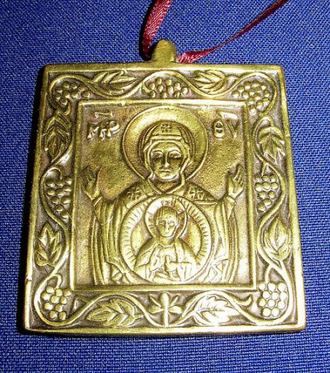Our Lady - Theotokos, Mother of God

Today the Church celebrates the oldest feast dedicated to Our Lady - Theotokos, Mother of God. This title was given to Mary at the Council of Ephesus in 431AD
The Second Vatican Council stated: "Clearly from earliest times the Blessed Virgin is honoured under the title of Mother of God." At an early stage, the Church in Rome celebrated on 1 January a feast that it called the anniversary (Natale) of the Mother of God.
When this was overshadowed by the feasts of the Annunciation and the Assumption, adopted from Constantinople at the start of the 7th century, 1 January began to be celebrated simply as the octave day of Christmas, the 'eighth day' on which, according to Luke 2:21, the child was circumcised and given the name Jesus.
In the 13th or 14th century, 1 January began to be celebrated in Rome, as already in Spain and Gaul, as the feast of the Circumcision of the Lord and the Octave of the Nativity, while still oriented towards Mary and Christmas, with many prayers, antiphons and responsories glorifying the maternity of Mary. Pope John XXIII's 1960 rubrical and calendrical revision removed the mention of the circumcision of Jesus and called 1 January simply the Octave of the Nativity.
The feast of the 'Maternity of the Blessed Virgin Mary' was established in Portugal in 1914 for celebration on 11 October and was extended to the entire Catholic Church by Pope Pius XI in 1931.
The 1969 revision of the liturgical year and the calendar states: "1 January, the Octave Day of the Nativity of the Lord, is the Solemnity of Mary, the Holy Mother of God, and also the commemoration of the conferral of the Most Holy Name of Jesus." It removed the 11 October feast, even for Portugal, stating: "The Maternity of the Blessed Virgin Mary is celebrated on 1 January in the Solemnity of Mary, the Mother of God."
In his Apostolic Letter, Marialis Cultus, Pope Paul VI explained: "This celebration, placed on January 1 ...is meant to commemorate the part played by Mary in this mystery of salvation. It is meant also to exalt the singular dignity which this mystery brings to the "holy Mother...through whom we were found worthy to receive the Author of life." It is likewise a fitting occasion for renewing adoration of the newborn Prince of Peace, for listening once more to the glad tidings of the angels (cf. Lk. 2:14), and for imploring from God, through the Queen of Peace, the supreme gift of peace."












